| > cMusicWeb.com > Modern Rock > Jars of Clay > Exclusive Interview |
|


[ gma week 2004 | nashville, tn | april 26, 2004 ]
|
|
|||
|
|
|
|
|
|
THEMUSIC
|
|||
|
|
|||
|
|
|||
|
CURRENTS
|
|||
|
|
|||
|
|
|||
|
SEARCH
|
|||
|
|||
|
|
|||
|
cMUSICMAIL
|
|||
|
|||
|
|
|||
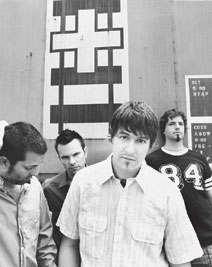 cMW: Describe some differences in your artist rider from your first big tour until now?
cMW: Describe some differences in your artist rider from your first big tour until now?Stephen Mason: One of the things was the dry cleaning service. Basically the original rider was based off of some super rock and roll star rider. We did not really alter it until we realized that we could ask for certain things that would be more useful.
Matt Odmark: We did not do a lot of dry cleaning.
Stephen: So we cut a bunch of stuff off and our essentials now are coffee and hot water, chips and salsa...
Matt: ...and beef jerky. That goes in our stockpile with a can of pork and beans that we keep just in case...
Stephen: ...in case the world comes to some sort of short-term emergency.
cMW: What is a typical day on tour?
Stephen: It definitely changes from season to season. This season we are currently in an acoustic mode. It is really stripped down to where the gear is all with us on stage. So we kind of get up and get moving in the morning and shower. We put our stuff together and change strings where we need to. I have really toxic hands, so I end up changing at least one guitar a day. After things are set up, some of our favorite things to do are [finding] used book stores and getting that good cup of coffee.
Matt: If we have any local flavor to bring to the experience and we have the time, we try to seek things out. We spend a lot of time these days dropping in on the radio stations and filling in our schedule with different opportunities to stay busy on the road doing phone interviews and stuff like that.
Stephen: We like to also engage locally — if people we know have recommended, "Hey you really should meet this person. This would be an interesting person for you to intersect with." That has happened more frequently — that we are in an area and from a mentor relationship someone has said, "I have this friend who is real interesting, and it would be good for you to talk about the relief work you are doing in Africa," or that sort of thing. It presents us with really neat opportunities.
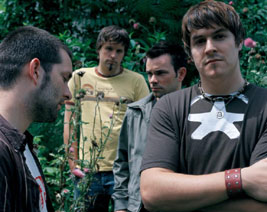 Matt: We spend a lot of time on college campuses, too. So when we are on college campuses, often in the afternoon we will host a symposium that discusses the situation in Africa, and how you as a local community member or college student can be involved and find a way to make a difference.
Matt: We spend a lot of time on college campuses, too. So when we are on college campuses, often in the afternoon we will host a symposium that discusses the situation in Africa, and how you as a local community member or college student can be involved and find a way to make a difference.cMW: Why college students?
Matt: College students are kind of our connecting point to our audience in the sense that musically that is who we connect the deepest with relationally. And as we have grown up in a band, that is the sustaining element of our audience. Our music is written more towards somebody in that phase of life. Asking the kind of questions about who they are and about faith and about the usefulness of art So those are some people we care about anyway because we are already in dialogue with them anyway with our music. So obviously it is more natural to get them involved.
cMW: So while we are on it, tell us a little bit more about the Blood:Water Mission.
Stephen: The organization was put together as Dan, our lead singer, went over to Zimbabwe, Malawi and South Africa. He was just quickened to bring this issue to the forefront of the church. A while back a guy from World Vision that we had known through our work with the persecuted church had started a work there. They found that the people they were training in irrigation and community development on the ground there — the locals we'll call them — were dying in great numbers dues to AIDS. It was wasting basically 20, 30, 40 years of work on the ground in some of these countries. You would drive around into some of these villages and not see anyone over 14 or 15 years old. And the part of this that was so troubling was that the church wasn't getting involved and wasn't responding. Or the response was that AIDS is a product of sin, and it is not the church's place to get involved.
 As Dan explored further, and as he shared a vision with us, we realized that if we as a culture, a world, got exactly what we deserved on even just one issue, there would be no hope but for God's mercy. We realize that this is an opportunity to be part of God's hand of mercy. And that is really what the church's role should be in the culture, more than the other things we spend time on. That got Dan fired up, and subsequently the rest of us fired up.
As Dan explored further, and as he shared a vision with us, we realized that if we as a culture, a world, got exactly what we deserved on even just one issue, there would be no hope but for God's mercy. We realize that this is an opportunity to be part of God's hand of mercy. And that is really what the church's role should be in the culture, more than the other things we spend time on. That got Dan fired up, and subsequently the rest of us fired up.This is something that we can use as a platform with our own audience as well as maybe the broader Christian faith audience to get involved and try to connect them with this problem — to keep this conversation happening. More specifically, though, on college campuses we try to plug them in with ways they can be involved. Whether that is a program we are trying to develop, where a community in Africa will actually be adopted by a campus. And if you are studying medicine, it would be more in that capacity, or agriculture or sociology. But there would be a mission of mercy type of program set up where they would do a semester or a year away and be involved in that — to develop that type of heart for students because it is a time when you are asking a lot of great questions about faith and life and how it applies.
Again, just because we have that burden for that age group specifically, because a lot of our stuff began when we were that age as Jars of Clay asking those type of questions. That really kind of set in the foundation of the band.
cMW: Why do you think that there are a lot of artists out there promoting different issues. For instance, there have always been ministries like Compassion and World Vision, but it seems to be spreading on to many other ministries. Why do you suppose it is the artists going out and promoting these as opposed to the church?
Stephen: A friend of ours, Steve Garver, said that artists are really upstream from the culture, and I think therein lies a great responsibility to really look at the world and communicate it through our art — how we see it and maybe we see it going or ways that our hearts are moved in response to what we see. I think that is what people look to as the art community — to help put that in some sort of context. Music and movies are especially powerful tools for that. And for whatever reason I think music in the last fifty-sixty years has really become a different compass in that regard.
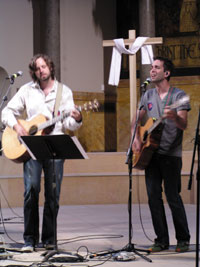 Matt: I think culturally we are seeing a big shift to where social issues have become very very important. A lot of people are describing the current generation moving up — the emerging culture of America is very concerned about social issues, issues of justice, poverty and disease. The culture is definitely asking the question of what they are supposed to do with all that stuff. As a culture, it is still kind of forming the idea of how exactly to attack these issues. But I think that these issues are important [to them]. Artists at some level are either responding to this realization of the culture or they are already feeling it themselves as a part of that culture. It is hard to know which it is.
Matt: I think culturally we are seeing a big shift to where social issues have become very very important. A lot of people are describing the current generation moving up — the emerging culture of America is very concerned about social issues, issues of justice, poverty and disease. The culture is definitely asking the question of what they are supposed to do with all that stuff. As a culture, it is still kind of forming the idea of how exactly to attack these issues. But I think that these issues are important [to them]. Artists at some level are either responding to this realization of the culture or they are already feeling it themselves as a part of that culture. It is hard to know which it is.I think it is a key moment in history to know where we as a church stand on these social issues because these are the important things of this generation, and if we ignore the conversations about social issues we are dismissing things that this culture cares very much about, and we are missing an opportunity to speak the Christian voice into the conversation. That may be a piece of the equation for why there are so many artists that are plugging into different organizations and ministries.
cMW: Has your music, or the words of the music, affected by some of the social issues that you are concerned about, or is it separate?
Stephen: Not necessarily. I think they are, but it is not as much of like we are writing songs to explain why we care about social issues. But I think even our song, "Show You Love" is a song that is reflecting on what is the natural response to this Christian story — what is the obvious response, what is all this talk about Jesus, what is it supposed to really propel me to do, what is it supposed to mean? I think at the end of the day, whether you are talking about worship or whether you are talking about The Passion, or whatever, you are talking about the person of Jesus. All these things point us to a different way of living in a way that shows a radical love to the world around you. In that way I think some of our brush with HIV in Africa and some of our brush with just seeing this sort of missional front lines of the church — whether it is in mercy or evangelism — is bleeding into our music. But we are not necessarily trying to use our music to explain why we are involved in this. It is just a different form of expression.
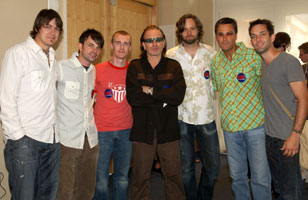 cMW: We are a website. How do you think the Internet has enhanced or hindered the heart of Jars of Clay?
cMW: We are a website. How do you think the Internet has enhanced or hindered the heart of Jars of Clay?Stephen: I think our band started almost simultaneously with the Internet. We were getting ready to sign our first record deal, and maybe AOL 2.0 was out, and email was becoming what a lot of university students were doing. So we were one of the first Christian bands to have a website. So our career has never been with a long season where the Internet has not been a factor. So I don't know that we are the best artist to comment on that.
cMW: Well I know it was pretty new when you first started out, but I did not even have a home computer until a few years later.
Stephen: And the growth of just the accessibility, I think the experience of music has changed quite a bit, even from when we began. Because now people not only want to be able to hear the music, they want to see it being made. They want to be a part of the process in the studio. And being able to dialogue with the band, too, which is a new thing. People are willing to pay for the privilege of being a part of the fan club, which these days is almost more of an accessibility than a signed 8"x10" or a T-shirt. It is more of the ability to get more information. I think culturally for whatever reason people want to figure out more about the band. It has become a larger thing than just the music.
Matt: I think when we first started, the Internet was this great new way to market music. It was all of a sudden this new open door, this new open set of communication between the consumer and the artist. Through the boom of the 90's and the Internet age it was almost like a glorious kind of time of opening up lines of communication, allowing the business boom as a result. Now I think the real hard core change is setting in whereas the Internet is really turning into the defining sort of rule for how we are going to experience music, both now and in the future, as opposed to the equivalent of a new...
Stephen: ...a new sound medium like the CD.
Matt: It is really becoming, as cliché as this may sound, more of a paradigm shift. Where as before it was this incredible new frontier attitude in the mid-90s when there was all of this new money to be made because of the Internet. That was basically when we first started, and it was an opportunity. Now it has become the gatekeeper to how we are going to experience things in the future. Like the Internet is becoming more and more important and radio is becoming — there is more of a question mark about how radio is going to play in the future than there is about how the Internet is going to play in the future with the experience of music. The next five or six years will be filled with turmoil, I think, rather than rapid growth.
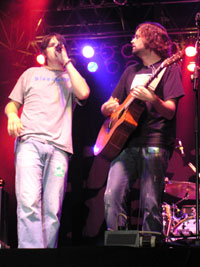 cMW: A lot of people (or Indie bands) say that there is a trend that less people will be signed to a record label because of the Internet. What do you think of that?
cMW: A lot of people (or Indie bands) say that there is a trend that less people will be signed to a record label because of the Internet. What do you think of that?Stephen: It is easier to get your name even further. It is an incredible vehicle for getting your name out there. On the one hand, it undermines the establishment of label/artist relationships and how that works. But in another regard, it has completely built a new infrastructure on how to become an independent artist. When we started, nobody owned a CD-burner. You had to send a master .DAT of your album to some disc reproduction place, and then they would make the CD for you. Nowadays you can do that in your living room.
Matt: Before the music industry was really the gatekeeper for how to nationally promote music. The expensive technology and forms of distribution made it exclusive. The Internet has really disrupted all of that in making any high school student who knows a little bit of web programming and a band with a fair amount of talent and decent skill on the computer can do what used to require a label. I think there are a lot more reasons to consider being an independent artist — especially now.
Everybody says that now is the worst time in the world to be signing a record deal just because so many things are in transition in the music industry. Not only because labels are in transition, but how the industry is going to work is in transition, who are going to be the key players are in transition, how is the system going to continue to feed itself. All of those things are changing, so in that kind of environment, it is questionable on whether or not you want to sign like we did when we first signed a deal — something that may lock you in for ten to twelve years or into a paradigm that may work totally different.
Plus there is the economic issue. When you sign a record deal, you go from making maybe eight dollars a record, to making less than a buck a record, and sharing some of that percentage with your management and stuff like that. So you have got to basically prove that a record company can sell at least eight times as many records. In a marketplace where record sales are down and competition is fiercer than it has ever been, record companies are on the hot seat. With the tools available to you as an independent artist and just being willing to get in your van and play shows, if you only sell half as many records as a record label, you still will be making a lot more money as an independent artist than an artist signed to a record deal.
It is an interesting time, and I think it is a great time for independent music. But at the same time, the pool of talent is very deluded. There are so many artists, and it makes the definition of good much blurrier. The pool of potential music expands exponentially.
Stephen: It is harder to get your head up and be visible.
Matt: There is a flip side to each season. There is no one perfect moment in the music business. Each moment has its advantages and disadvantages. It is a time in the industry where you never know what is going to happen, that is for sure. And it hasn't always been that way. That's exciting. I am sure people will look back 25 years from now and talk about this moment in the music industry and reflect on this — "Did you ever see this coming?" or "Did you ever think it would turn out like this?"
- Kim Flanders
July 2004
July 2004
Articles written by the staff.
Maintained by WebMaster Dan Ficker.
Site Design by da Man
All Material © 1999-2005 Different Media LLC
Support cMusicWeb.com